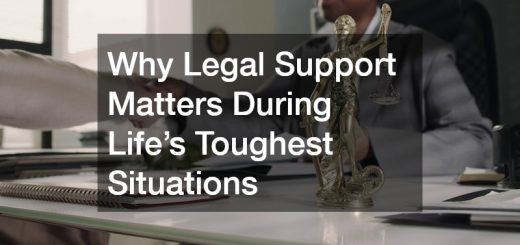How to Find the Right Attorney For Your Case

A great legal match does more than file papers or show up in court. The right attorney brings clarity, steady communication, and a strategy that fits your goals, timeline, and budget. That fit is not about flashy bios or the loudest ads. It is about aligning your legal problem with the specific skills, resources, and work style of a lawyer who has handled similar matters many times before.
This guide breaks the search into practical steps you can follow today. You will define your priorities, understand pricing, check credentials, and run consultations like a pro. Along the way, you will learn how to separate style from substance, how to evaluate strategy, and how to set the relationship up for success. The result is confidence that your matter is in capable hands, and that you know what happens next.
Start With a Clear Problem Statement
Begin by writing a short, plain-language description of what happened, what you want to achieve, and what you fear most. Include dates, deadlines, and any documents that define your risk, such as notices, contracts, tickets, or medical records. A tight summary helps you communicate efficiently and lets attorneys see the scope quickly. It also makes it easier to compare advice from different firms on the same facts.
Add a one-page timeline that lists key events in order. Mark any court dates, agency filing windows, or contract milestones that could affect leverage. Bring this page to every consultation. Attorneys make stronger recommendations when the facts are organized, and you will save time by answering common questions up front.
Choose by Practice Area, Not Popularity
Law is specialized. A lawyer who thrives in one field may be out of depth in another. If your claim involves injuries after a crash or a fall, you want a seasoned personal injury attorney who understands liability standards, insurers, and medical proof. Practice-area experience shortens the learning curve and helps you avoid missteps that delay fair outcomes.
Criminal charges call for a very different skill set. If you face an alcohol-related charge, you will get better traction from DUI attorneys who handle tests, traffic stops, and suppression issues every week. Specialists know the common weaknesses in evidence, the local bench, and the practical options for resolution. That is hard to replicate with general experience alone.
Match Experience to the Stakes
When liberty, immigration status, or career licensing is on the line, deeper trial experience matters. If your case involves serious counts or potential long sentences, a seasoned felony lawyer can pressure-test the evidence, evaluate plea risks, and prepare for trial with a realistic eye. You are not buying drama. You are buying judgment earned from years of contested hearings.
High-stakes civil cases need similar calibration. Complex business disputes, high-dollar injury claims, or matters that could set a precedent for your industry call for counsel who has managed large discovery, experts, and injunctions. Ask about the team’s size, support staff, and how they staff emergencies. The right match balances resources with the real needs of your case.
Make Local Knowledge Work for You
Courts have rhythms and preferences that do not appear in statutes or rules. Lawyers who practice regularly in your venue know the unwritten expectations that keep cases moving. When arrests, arraignments, or plea negotiations are on the table, local criminal lawyers will understand typical offers, docket flow, and diversion programs. That insight makes day-to-day decisions sharper and faster.
Local familiarity also helps with filings, scheduling, and motion practice. Judges differ on what they want in briefs and how they handle disputes. Attorneys who appear often know how to tailor presentations to be efficient and persuasive. Those small advantages compound over the life of a case, saving time and guarding against avoidable delays.
Understand How Fees Really Work
Most firms bill by the hour, a flat fee, or a contingency percentage. Injury matters often use performance-based pricing, which means you pay only if there is a recovery. If that is your situation, a personal injury attorney should explain how costs for records, experts, and depositions are handled, and when those costs are deducted. Clear terms prevent surprises when a case resolves.
Criminal, family, and administrative matters often use flat fees for defined stages. Ask what is included, when payments are due, and what triggers a shift to hourly rates. Good firms will also show you how they keep costs down with templates, paralegals, and efficient scheduling. The goal is a predictable plan that matches the complexity of the work.
Verify Licenses, Discipline, and Capacity
Check bar status and any public discipline before you set a meeting. Confirm years in practice, active licenses, and whether the attorney has capacity to take your case now. If you are planning for future asset transfers or guardianship, it helps to speak with estate planners who have time to walk you through options. The best estate planning lawyers aim for clarity, not jargon.
Credentials do not end at diplomas. Ask about recent matters that resemble yours, the role the lawyer played, and the outcome. Invite plain talk about hurdles you will face and what success looks like at different budget levels. You want someone who sets expectations, respects constraints, and puts everything in writing.
Keep Communication Front and Center
Ask how the firm communicates, how often you will get updates, and who returns calls. Good lawyers align on channel, frequency, and urgency because responsiveness builds trust. If written updates help you keep calm, say so. If you prefer short calls after key events, put that in the engagement letter so it becomes part of the plan.
Fit matters. Some clients want deep explanations. Others want options with crisp pros and cons. During your first meetings, watch whether the attorney listens, restates your goals, and speaks in language you understand. Strong communication habits today predict fewer misunderstandings tomorrow.
Use Consultations to Test Strategy
Treat the first meeting like a working session. Bring your timeline, your top questions, and the three outcomes you would accept. Ask the lawyer to walk through the first 30, 60, and 90 days, and to explain what could change that plan. How someone reasons through next steps is more revealing than a list of past victories.
When you have complex family or legacy issues, the first session is also a chance to explore coordinated planning. Experienced estate planning lawyers often work alongside accountants and financial advisors to reduce risk across taxes, guardianship, and asset protection. Multi-disciplinary thinking is useful when several life events intersect at once.
Take Special Circumstances Seriously
Benefits and disability claims involve medical evidence, work history, and precise deadlines. If health limits your ability to work, speak with a social security attorney who knows the forms, sources of proof, and appeal steps. They can tell you which records matter most and how to avoid common mistakes that slow approval.
Home pressures can be just as urgent as health. If you are behind on payments and worried about losing your house, a foreclosure prevention attorney can explain forbearance, loss mitigation, and litigation options. Early guidance preserves choices. The later you wait, the fewer tools the system allows.
Look for Alignment on Values and Tactics
Some matters reward a quiet, negotiated resolution. Others demand aggressive discovery or firm motion practice. During your meetings, ask how the lawyer approaches conflict and what they see as the fastest path to your goal. Pay attention to whether they pressure you into a strategy that does not fit your risk tolerance. The right match balances speed, cost, and peace of mind.
Criminal cases are a good example of this balance. If a charge stems from a traffic stop, DUI attorneys should explain both plea paths and suppression tactics, then map how each choice affects your job, license, and record. With a clear picture of tradeoffs, you can make decisions that reflect your priorities rather than the emotions of the moment.
Plan for the Long Term
Some legal solutions live on after the case closes. Families with dependents, aging parents, or disability concerns often need documents and accounts to work together without friction. In those situations, special needs trust lawyers can explain how to protect eligibility for public benefits while funding care. Planning today prevents stressful tradeoffs later.
Estate documents deserve similar attention. Wills, powers of attorney, and health care directives reduce confusion, protect preferences, and save time for loved ones. When you want dedicated document drafting and updating, seek will attorneys who keep forms current with state law and who can coordinate with financial custodians. Good planning makes tomorrow’s emergencies easier to manage.
Set Realistic Timelines and Milestones
Legal calendars move at the pace of courts, agencies, and counterparties. Ask for a conservative schedule, then identify milestones that indicate progress. If there is a hearing or filing deadline, ask what needs to be done two weeks, one week, and one day before. With a shared checklist, everyone knows what to expect.
Civil matters often hinge on discovery, expert opinions, and negotiation windows. Criminal timelines run with arraignments, pretrial conferences, and motion cutoffs. Social benefits and housing matters have agency clocks of their own. A lawyer who lays out dependencies and bottlenecks is setting you up to make better decisions under pressure.
Read the Engagement Letter Closely
Every relationship starts with a contract. Review the scope, fee model, billing intervals, and who will work on your case. Confirm the process for approving expenses and the rules for ending the relationship. Good agreements spell out responsibilities so there is no confusion when the work gets busy.
If your matter is about property transfers or long-range planning, the document is also where you confirm coordination with other professionals. Will drafting may be straightforward today, but your family situation can change quickly. Make sure there is a plan for future updates, storage of originals, and who can request copies when needed.
Balance Cost Against Risk
The lowest initial price is not always the best value. Consider the cost of errors, delays, or missed defenses. If a filing secures housing, benefits, or a license, a higher fee for a stronger chance of approval can be the wiser spend. Value is measured by outcomes and avoided problems, not just hourly rates.
At the same time, you should not feel trapped. Ask about limited-scope options when the task is discrete, such as reviewing a contract or coaching for a hearing. For document-focused matters, will attorneys and planners often offer fixed fees for specific packages. Align the level of service with what the situation truly requires.
Build a Shortlist and Decide
After two or three consultations, pick your frontrunner and a backup. Compare how clearly each lawyer explained next steps, how they listened, and how their strategy fit your goals. If your health prevents work and you are pursuing benefits, weigh how directly a social security attorney addressed medical proof, deadlines, and appeals. Clarity is the best predictor of a smoother path.
If housing is on the line, note who gave you concrete steps to stop the clock or open negotiations. A foreclosure prevention attorney should talk in checklists, not platitudes, and should be realistic about timelines. Choose the person who helped you understand tradeoffs without fear tactics. That tone will carry through the relationship.
Keep Your Case Organized
Once you hire, become an easy client to help. Respond quickly to document requests, label files by date, and create a single folder for emails and letters. If you cannot find an item in 60 seconds, scan it, name it, and save it in a standard format. Organization lowers your bill and raises the quality of your lawyer’s work.
Ask your firm for a shared list of upcoming tasks. Confirm who owns each step and when it is due. If new facts arise, send a short update with only the key details and attachments. Clear, concise communication keeps momentum and prevents drift.
Use Checkpoints to Adjust Strategy
Cases evolve. Schedule short check-ins at logical moments to confirm whether the plan is still right. If the prosecutor changes or an adjuster rotates off, the landscape can shift. Your team should be ready to pivot to protect your goals.
Criminal, civil, and family matters all benefit from this discipline. If negotiations stall in a driving case, DUI attorneys may recommend a motion practice that was not necessary before. If a court sets a surprise deadline, the plan may need new staffing. Flexibility is a strength, not a sign of weakness.
When Your Case Involves Public Benefits
Disability applications and appeals are technical and deadline driven. If you need guidance from start to finish, a social security attorney will help gather the right records, prepare you for hearings, and manage agency communications. They should explain how decisions are made and what evidence carries the most weight. A steady hand through an unfamiliar system is valuable.
If children or adults in your family rely on long-term support, legal planning intersects with benefits in complex ways. Special needs trust lawyers can design tools that hold assets for care without compromising eligibility. Good counsel will coordinate with financial advisors and explain trustee duties in plain language. Careful planning today avoids painful gaps in the future.
Handle Housing Stress With a Plan
Mortgage arrears can spiral quickly without a structured response. Early conversations with a foreclosure prevention attorney can surface options to pause, restructure, or contest a process error. You will also learn what papers to keep handy and how to handle calls. Even if the news is hard, a plan is better than uncertainty.
Housing issues often overlap with job loss, health setbacks, or family changes. Let your lawyer know about those pressures so they can seek short-term breathing room where possible. Clear priorities help your team direct effort where it will matter most. That is the best way to protect stability while you work on long-term solutions.
Close the Loop With a De-brief
When your matter ends, meet once more to review what went well, what did not, and what to watch for next. Ask for a copy of your file and a list of dates to revisit documents. If you have children, property, or a business, set reminders to update plans after life changes. Good legal hygiene prevents small issues from growing.
This is also a good time to consolidate your professional network. Keep contact information for the attorney, their key staff, and any trusted referrals. If issues return, you start with momentum and context. That continuity lets you act faster and with less uncertainty.
Finding the right lawyer is not about buzzwords or the biggest office. It is about matching your problem, budget, and tolerance for risk with a professional who works that type of matter every day. Whether you need careful planning for future documents from will attorneys, targeted help in a benefits process from a social security attorney, or defense for charges best handled by DUI attorneys, the path is the same. Define the goal, ask precise questions, and choose the person who explains the next steps in calm, concrete terms.



